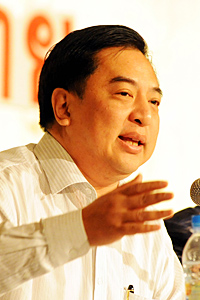
Thailand has been mourning the passing of His Majesty King Bhumibol Adulyadej -- the father to the land and the country's pillar of stability and unity.
Large crowds have been gathering daily around the Grand Palace to pay respect to the late King. Many took a long walk to get a glimpse of the procession of the royal family attending the religious rites.
As we mourn, we must honour what His Majesty the King believed in and follow his dedication towards creating national unity.
The best way to do so is to compose ourselves with consciousness, or sati in Thai, and help preserve the late King's legacy.

Suranand Vejjajiva was secretary-general to the prime minister during the Yingluck Shinawatra government and is now a political analyst.
During his 70-year reign, His Majesty the King had forged national unity and pulled the country through changes and challenges, domestically and internationally.
His long reign provided the nation with the stability which had become the basis for economic growth and modernisation.
His rule was benevolent and compassionate. He propelled his thoughts and ideas into royal development projects to solve the people's woes. His down-to-earth and modest way of life became a model for Thais. He will be greatly missed beyond any words.
His Majesty the King strengthened Thailand's constitutional monarchy. He respected all constitutions and supported the executive, legislative and judicial branches in his capacity as head of state.
Under the charter, the monarch is above politics. This proved beneficial in crises when His Majesty acted as a "safety valve", defusing political conflicts and calming adversarial groups. The King's approach resolving conflicts prevented a number of key violent events from escalating into civil war and social unrest.
It was not easy. Certainly, it was not an overnight phenomenon. Ascending to the throne in 1946 (with the official coronation in 1950), he was a young king at a time of political turmoil, 14 years after the bloodless 1932 Revolution that transformed the country from an absolute, to constitutional, monarchy and one year after the end of the World War II when Thailand was in a difficult situation following its alliance with Japan in the war.
During the time of competing interests among factions of Khana Ratsadon, or the People's Party (who staged the 1932 Revolution), and the turning tide of aristocrats (who lost power and influence, and consequently formed ties with the army), His Majesty managed to position himself.
As public frustration with political bickering and power grabbing grew, people began to look towards him as a symbol of stability and hope. His Majesty's popularity was rising, as he became a pillar of the nation.
His trips abroad in the early 1960s gained immense international recognition. They helped cement the country's credibility as Thailand started to forge alliances with Western countries amid the looming threats of communism in the region.
It was a volatile period in the world and particularly in Southeast Asia. His high-level diplomacy opened doors for Thailand to play a role in the Cold War era. The Vietnam War had US troops fully engaged.
Thailand fought a domestic communist insurgency. We would have lost if had we fought a war with military forces; but a fight which coupled economic and social development into the far-reaching areas could win as it addressed poverty and lost opportunities.
The leading champion of the idea and the practice was His Majesty the King. He travelled to all parts of the country with a keen interest in the people's welfare and initiating royal projects designed to improve their lives.
As a result, people felt unity with the state and rejected the communist propaganda. Thailand pulled through the testing times of the 1960s and 1970s even when the United States lost the Vietnam War in 1975.
During the popular uprising against the military dictatorship on Oct 14, 1973, His Majesty urged the nation to end the violence that caused at least 77 deaths and hundreds of casualties.
On May 20, 1992, he played a similar role again in the wake of the military's crackdown on political protesters, mediating the political conflict and calling for the opposing parties to end their confrontation.
His Majesty had always been the one who listened to his people. During his visits upcountry, he frequently asked local people about their lives and the plight they were facing. He was also open to criticism.
In his annual address on Dec 4, 2005, he insisted that saying "the King can do no wrong is very much an insult to the King", adding that "this shows that they regard that the King is not human". His Majesty said he would like to be informed of criticism, so any issues and problems can be addressed.
However, one must be conscious -- mee sati -- of what should be thought, said and done, so that he or she would not be wrong and break the harsh rules governing free speech on the monarchy. On this matter, regrettably, Thailand has seen a tremendous rise in lèse majesté cases in the past decade.
Many of them were clear attempts to defame His Majesty, to which the judicial process must be used to protect his right and the institution. Some cases, however, have been used as a tool to get rid of political opponents.
Lèse majesté complaints have risen amid the age of social media, whereby anyone can post anything that instantly offends others. The decade-long, colour-coded political conflict that pits the progressives against conservative royalists was full of rhetoric harbouring lèse majesté allegations. Emotions ran high and violence was easily sparked.
Even during the past few days of the mourning period, commotions erupted in Phuket and Phangnga as angry mobs demanded the arrest of social media users for their posting of comments deemed insulting to His Majesty.
This should not be the way we honour the passing of the great King.
